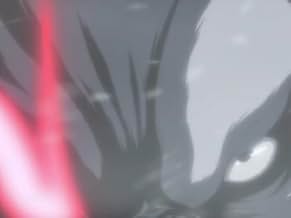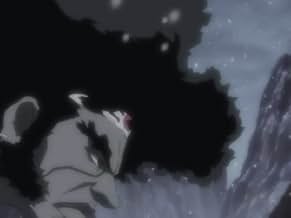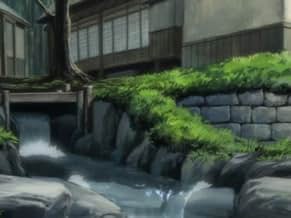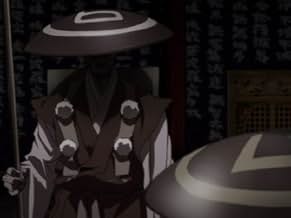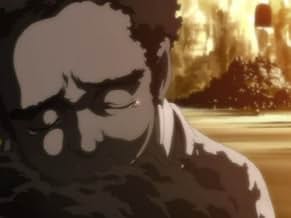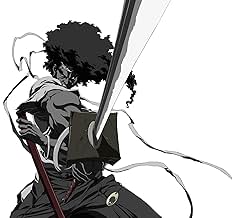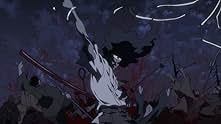A Black samurai goes on a mission to avenge the wrongful death of his father in a futuristic feudal Japan.A Black samurai goes on a mission to avenge the wrongful death of his father in a futuristic feudal Japan.A Black samurai goes on a mission to avenge the wrongful death of his father in a futuristic feudal Japan.
Browse episodes
Featured reviews
alright, so i've real a lot of negative reviews of this show on here. Well kids, i'm going to defend this show, because there's a lot too it you guys are missing out on.
Afro Samurai is the new anime produced by and starring Mr. Samuel L. Jackson, as well as high end voice talent like Phil LaMarr of Samurai Jack fame, and Ron Perlman, the man who is and will always be Hellboy.
Like the great works of Shinichiro Watanabe, this work employs heavily the influence of western culture, specifically black western culture, which i suppose makes sense considering our stoic protagonist. now when i say black western culture, i'm not just talking about hip-hop music, i'm talking about Blaxploitation as well.
for those of you who don't know, Blaxploitation was a sub-genre of the 70's Exploitation films that dominated the drive-in scene during that period of American cinema history. the most famous and accessible Blaxploitation films these days are probably the Dolemite series of films, the Shaft series, or the classic Sweet Sweetback's Badass Song. these films were, for the most part terrible, but they influenced a generation of post-civil rights urban youth struggling to find an identity into action. they were stylish, fun, and gave an overall message of standing up for yourself and being proud of who you are, despite their inherent sexism, these films were the Noir flicks of their day, gritty and edgy and bleeding style. theaters in the 70's that would carry Exploitation and Blaxploitation films also carried many Kung Fu and Samurai films, so when 70's funk culture evolved into hip hop culture, it wasn't so shocking that the children who idolized Sweet Sweetback, also pulled influence from Yojimbo and Zoatichi, in fact, one of those children of influence even did the score for Afro Samurai - The RZA of The Wu Tang Clan, a seminal rap group that not only incorporated samurai and kung fu films into their lyrics, but into the music itself as well.
Okay, History lesson over, the reason i wanted to make you read all that is so that you have a better idea of where Afro Samurai is coming from, it is, for all intents and purposes, the coming together of cultures that are not, and have never been so far apart as you may think. a lot of people are also calling Afro-Samurai a child of the spaghetti western genre, which i suppose is true, but it must also be understood that the spaghetti western was heavily influenced by samurai films before them. Sergio Leone probably wouldn't even have a career if it wasn't for Akira Kurosowa's films.
Now, onto the show itself. Afro Samurai is incredibly simple, but i say that in the most endearing way possible. being convoluted is not a prerequisite of having substance or being artistic. Samurai Jack, a long running and long praised show has proved this time and again. great stories like the Hellboy series of comics or the popular Battlestar Galactica show, are great because they manage to turn schlocky cheese into high art, by giving it a modern overhaul. Afro Samurai takes it one step further, to the point where the schlock IS the art. Anime is very much like our version of the Exploitation genre of yesteryear, it's very underground, but still holds popularity and knowledge in the mainstream, it's filled with shitty crap, but the good stuff is worth watching, and it has it's own very unique style that has influenced generations of artists who've been exposed to it.
the story of Afro Samurai is very very basic, it's a revenge story because it needn't be anything more than a revenge story. it's intent isn't to change your life or make you weep for it's tragic hero, it's intent is to make your eyes melt and your heart pump, and maybe throw in a laugh or two. there's a saying: You Don't watch Kill Bill the same way you watch Shindler's List. that applies.
shows like Afro Samurai and the vampire miniseries Hellsing are fantastic shows because they take from the well of culture not everybody likes to admit is there, and shows you something that takes it one step further, shows you what those film makers of yesteryear could have done with the technology at our disposal today. they work on a storytelling level because the stories are simple and have been told many times. they are human stories.
the idea of Afro Samurai, i can say with some confidence, was never to get you thinking about our society like Ghost in the Shell or Neon Genesis, it's not that horse. Afro Samurai is meant to appeal to something deeper than your ego or your intellect, it appeals to your instinct. that's why it's so stylish. it's pleasure is purely aesthetic, and that is not at all a bad thing. Anime has a long history of taking from western culture and vice-versa, i like to think of Afro Samurai less as a corny bloodbath, and more a celebration of the corny bloodbaths we all know and love. western stories like Fist Full o' Dollars, The Good The Bad and The Ugly, and eastern stories like Ninja Scroll and Yojimbo. the standard for art these days is too narrow and too pretentious considering our history. i love Afro Samurai because it's not trying to deny all the things we hate to love, blood, gore, revenge, and i'm not saying that to be nihilistic or cynical. i'm saying that because it's true, it's just easier to justify revenge and blood and gore when we can come up with some over-convoluted plot to fit it into. well screw that.
Enjoy.
Afro Samurai is the new anime produced by and starring Mr. Samuel L. Jackson, as well as high end voice talent like Phil LaMarr of Samurai Jack fame, and Ron Perlman, the man who is and will always be Hellboy.
Like the great works of Shinichiro Watanabe, this work employs heavily the influence of western culture, specifically black western culture, which i suppose makes sense considering our stoic protagonist. now when i say black western culture, i'm not just talking about hip-hop music, i'm talking about Blaxploitation as well.
for those of you who don't know, Blaxploitation was a sub-genre of the 70's Exploitation films that dominated the drive-in scene during that period of American cinema history. the most famous and accessible Blaxploitation films these days are probably the Dolemite series of films, the Shaft series, or the classic Sweet Sweetback's Badass Song. these films were, for the most part terrible, but they influenced a generation of post-civil rights urban youth struggling to find an identity into action. they were stylish, fun, and gave an overall message of standing up for yourself and being proud of who you are, despite their inherent sexism, these films were the Noir flicks of their day, gritty and edgy and bleeding style. theaters in the 70's that would carry Exploitation and Blaxploitation films also carried many Kung Fu and Samurai films, so when 70's funk culture evolved into hip hop culture, it wasn't so shocking that the children who idolized Sweet Sweetback, also pulled influence from Yojimbo and Zoatichi, in fact, one of those children of influence even did the score for Afro Samurai - The RZA of The Wu Tang Clan, a seminal rap group that not only incorporated samurai and kung fu films into their lyrics, but into the music itself as well.
Okay, History lesson over, the reason i wanted to make you read all that is so that you have a better idea of where Afro Samurai is coming from, it is, for all intents and purposes, the coming together of cultures that are not, and have never been so far apart as you may think. a lot of people are also calling Afro-Samurai a child of the spaghetti western genre, which i suppose is true, but it must also be understood that the spaghetti western was heavily influenced by samurai films before them. Sergio Leone probably wouldn't even have a career if it wasn't for Akira Kurosowa's films.
Now, onto the show itself. Afro Samurai is incredibly simple, but i say that in the most endearing way possible. being convoluted is not a prerequisite of having substance or being artistic. Samurai Jack, a long running and long praised show has proved this time and again. great stories like the Hellboy series of comics or the popular Battlestar Galactica show, are great because they manage to turn schlocky cheese into high art, by giving it a modern overhaul. Afro Samurai takes it one step further, to the point where the schlock IS the art. Anime is very much like our version of the Exploitation genre of yesteryear, it's very underground, but still holds popularity and knowledge in the mainstream, it's filled with shitty crap, but the good stuff is worth watching, and it has it's own very unique style that has influenced generations of artists who've been exposed to it.
the story of Afro Samurai is very very basic, it's a revenge story because it needn't be anything more than a revenge story. it's intent isn't to change your life or make you weep for it's tragic hero, it's intent is to make your eyes melt and your heart pump, and maybe throw in a laugh or two. there's a saying: You Don't watch Kill Bill the same way you watch Shindler's List. that applies.
shows like Afro Samurai and the vampire miniseries Hellsing are fantastic shows because they take from the well of culture not everybody likes to admit is there, and shows you something that takes it one step further, shows you what those film makers of yesteryear could have done with the technology at our disposal today. they work on a storytelling level because the stories are simple and have been told many times. they are human stories.
the idea of Afro Samurai, i can say with some confidence, was never to get you thinking about our society like Ghost in the Shell or Neon Genesis, it's not that horse. Afro Samurai is meant to appeal to something deeper than your ego or your intellect, it appeals to your instinct. that's why it's so stylish. it's pleasure is purely aesthetic, and that is not at all a bad thing. Anime has a long history of taking from western culture and vice-versa, i like to think of Afro Samurai less as a corny bloodbath, and more a celebration of the corny bloodbaths we all know and love. western stories like Fist Full o' Dollars, The Good The Bad and The Ugly, and eastern stories like Ninja Scroll and Yojimbo. the standard for art these days is too narrow and too pretentious considering our history. i love Afro Samurai because it's not trying to deny all the things we hate to love, blood, gore, revenge, and i'm not saying that to be nihilistic or cynical. i'm saying that because it's true, it's just easier to justify revenge and blood and gore when we can come up with some over-convoluted plot to fit it into. well screw that.
Enjoy.
Everything about it is what I wanted for a anime, a actual good style (unlike boruto), great use of fighting, and not a too long story that will lose it's purpose, I only rated it a 8 though due to the fact that many things are just left out in the open, what about justice (the guy who killed afro's father) legacy and Afro's Father too? They seem like great characters and should have been shown more. I highly recommend it, and it is definitely a anime completely different from other animes, way more mature, unlike those disgusting anime shows that use girls as tools, 8/10, my favourite anime despite not watching anime as much as I used to.
10dee.reid
Can you dig it?
This is what you get when you mix Japanese samurai flicks, ultra-savvy blaxploitation attitude, future-tense technology, and hip-hop into one energetic camp hybrid that takes NO prisoners.
The pseudo-Anime' "Afro Samurai" is set in a futuristic feudal Japan, in which all the swordsmen in the world are in a murderous pursuit of the #1 Headband, which once obtained, would allow its wearer to call himself a god and master of all that he surveys. So when #1 is killed in a battle with gun-totting madman and #2 Headband Justice (Ron Perlman), #1's son Afro (Samuel L. Jackson) swears an oath of vengeance against now-#1 Justice. Undergoing conventional samurai training by a renowned master, young Afro grows up, receives the #2 Headband, sets out on his mission of revenge and attempts to obtain the #1 Headband, cutting down every single man who challenges him. Bearing witness to it all is Afro's loyal sidekick and only friend, Ninja Ninja (also voiced by Jackson), who provides much of the show's comic relief.
In many ways, at least to me, "Afro Samurai" was a long time coming. Ever since first getting wind of it in late 2006 and catching a few episodes during its short, five-episode run on Spike TV earlier this year, I've become an "Afro Samurai" fanatic. As a longtime fan of Japanese animation and Manga (Japanese comics), "Afro Samurai" cut and slashed its way into my heart from its earliest moments when Afro's father is challenged and defeated by the maniacal Justice. I've waited a long time for something to come along that fused hip-hop and Japanese animation into a relentless action feast and when it finally came along, I was not the slightest bit displeased. The animated show "The Boondocks" is another example of this Anime'/hip-hop trend done right.
But first and foremost, "Afro Samurai" is only concerned with one thing: style over substance, that means excessive sword-play and violence over anything even remotely resembling a discernible plot. Make no mistake, though, while this is a visually arresting feast for the eyes, it is definitely not for the squeamish, much less anyone under the tender age of 17. The brain-child of creator Takashi Okazaki, director Fuminori Kizaki and co-writers Tomohiro Yamashita and Yasuyuki Muto, "Afro Samurai" lets the blood flow (but really, more like spray) in fountains and geysers. The blood flows in copious amounts in the various martial arts sword-fighting sequences, which are excellently and stylishly executed much like Quentin Tarantino's "Kill Bill" movies or your favorite samurai blood-letters. The dynamic and surreal score by Wu-Tang Clan co-founder and "Afro Samurai" soundtrack producer The RZA is quite a stand-out, and blares up during the most intense action. Any soundtrack that features hip-hop legends such as Big Daddy Kane, Wu-Tang Clan co-founder GZA, Q-Tip (formerly of A Tribe Called Quest), and Talib Kweli - you can bet I'm picking it up.
So as you can see, I've said nothing but good things thus far. Many have maligned the fact that since Afro speaks so little in this series, his character comes to be defined by the way he viciously cuts down his adversaries in the many battle sequences. Probably like your favorite swordsman who speaks little but carries a big sword, Afro is really nothing new. In fact, if you look deeper, his comic foil Ninja Ninja could also be considered Afro's wild, fun-loving, and talkative alter-ego (since there were a few times when I felt Ninja Ninja wasn't even real).
"Afro Samurai" also has one of the most memorable casts of bad guys ever assembled for animation outside of Japan. I already mentioned Justice, but there's also the monk/assassin collective, the Empty 7, the teddy bear-headed Kuma, and assorted heavy artillery-totting hired killers and disposable bandits and hoodlums. Although I was a little disappointed that babe Kelly Hu as Okiku didn't have a bigger role, she only seemed to be in it for the sex appeal (and as the director's cut proves, to give a little something for the guys who may be watching). Although an odd choice for a role such as this, Samuel L. Jackson is a thorough double-edged sword as both Afro and Ninja Ninja. (It's hard to believe this is the same man who once played the Bible-quoting hit-man Jules Winnfield in 1994's "Pulp Fiction.")
With "Afro Samurai," an Anime' fan gets something that he's always wanted and more: a piece of animation that blends so many distant genres and fuses them into one hell of an eye-popping action experience. Now, if only he can convince his other Anime'- and "Kenshin"-loving friends to watch the one and only dude wit' a head full of hair, "Afro Samurai."
10/10
This is what you get when you mix Japanese samurai flicks, ultra-savvy blaxploitation attitude, future-tense technology, and hip-hop into one energetic camp hybrid that takes NO prisoners.
The pseudo-Anime' "Afro Samurai" is set in a futuristic feudal Japan, in which all the swordsmen in the world are in a murderous pursuit of the #1 Headband, which once obtained, would allow its wearer to call himself a god and master of all that he surveys. So when #1 is killed in a battle with gun-totting madman and #2 Headband Justice (Ron Perlman), #1's son Afro (Samuel L. Jackson) swears an oath of vengeance against now-#1 Justice. Undergoing conventional samurai training by a renowned master, young Afro grows up, receives the #2 Headband, sets out on his mission of revenge and attempts to obtain the #1 Headband, cutting down every single man who challenges him. Bearing witness to it all is Afro's loyal sidekick and only friend, Ninja Ninja (also voiced by Jackson), who provides much of the show's comic relief.
In many ways, at least to me, "Afro Samurai" was a long time coming. Ever since first getting wind of it in late 2006 and catching a few episodes during its short, five-episode run on Spike TV earlier this year, I've become an "Afro Samurai" fanatic. As a longtime fan of Japanese animation and Manga (Japanese comics), "Afro Samurai" cut and slashed its way into my heart from its earliest moments when Afro's father is challenged and defeated by the maniacal Justice. I've waited a long time for something to come along that fused hip-hop and Japanese animation into a relentless action feast and when it finally came along, I was not the slightest bit displeased. The animated show "The Boondocks" is another example of this Anime'/hip-hop trend done right.
But first and foremost, "Afro Samurai" is only concerned with one thing: style over substance, that means excessive sword-play and violence over anything even remotely resembling a discernible plot. Make no mistake, though, while this is a visually arresting feast for the eyes, it is definitely not for the squeamish, much less anyone under the tender age of 17. The brain-child of creator Takashi Okazaki, director Fuminori Kizaki and co-writers Tomohiro Yamashita and Yasuyuki Muto, "Afro Samurai" lets the blood flow (but really, more like spray) in fountains and geysers. The blood flows in copious amounts in the various martial arts sword-fighting sequences, which are excellently and stylishly executed much like Quentin Tarantino's "Kill Bill" movies or your favorite samurai blood-letters. The dynamic and surreal score by Wu-Tang Clan co-founder and "Afro Samurai" soundtrack producer The RZA is quite a stand-out, and blares up during the most intense action. Any soundtrack that features hip-hop legends such as Big Daddy Kane, Wu-Tang Clan co-founder GZA, Q-Tip (formerly of A Tribe Called Quest), and Talib Kweli - you can bet I'm picking it up.
So as you can see, I've said nothing but good things thus far. Many have maligned the fact that since Afro speaks so little in this series, his character comes to be defined by the way he viciously cuts down his adversaries in the many battle sequences. Probably like your favorite swordsman who speaks little but carries a big sword, Afro is really nothing new. In fact, if you look deeper, his comic foil Ninja Ninja could also be considered Afro's wild, fun-loving, and talkative alter-ego (since there were a few times when I felt Ninja Ninja wasn't even real).
"Afro Samurai" also has one of the most memorable casts of bad guys ever assembled for animation outside of Japan. I already mentioned Justice, but there's also the monk/assassin collective, the Empty 7, the teddy bear-headed Kuma, and assorted heavy artillery-totting hired killers and disposable bandits and hoodlums. Although I was a little disappointed that babe Kelly Hu as Okiku didn't have a bigger role, she only seemed to be in it for the sex appeal (and as the director's cut proves, to give a little something for the guys who may be watching). Although an odd choice for a role such as this, Samuel L. Jackson is a thorough double-edged sword as both Afro and Ninja Ninja. (It's hard to believe this is the same man who once played the Bible-quoting hit-man Jules Winnfield in 1994's "Pulp Fiction.")
With "Afro Samurai," an Anime' fan gets something that he's always wanted and more: a piece of animation that blends so many distant genres and fuses them into one hell of an eye-popping action experience. Now, if only he can convince his other Anime'- and "Kenshin"-loving friends to watch the one and only dude wit' a head full of hair, "Afro Samurai."
10/10
Afro Samurai started as life as manga before animation studio GONZO adapted the story into a five episode series that premiered online January 1 2007.
Like most contemporary anime, Afro Samurai is another exercise in culture jamming, straddling genres as diverse as Blaxploitation, kung-fu cinema, splatter flicks, western and, of course, Japanese animation. Samuel L. Jackson lends his talents in the voice department, and is also credited as one of the shows producers.
The plot revolves around Afro - nicknamed after his hairstyle - a perpetually silent and bloodthirsty master swordsman, whose quest involves exacting bloody revenge on the man who killed his father, and claiming the title of 'Number One'; a warrior whose powers are comparable to those of a god. Given only five episodes to work with, structure is pretty tight here, so there are no filler episodes or meandering off-sides or tangents to distract from the narrative's focus. Although the series seems to lack that 'epic' journey feel, episodes are never anti-climactic; this is a relief to the casual anime viewer who just wants to get to the carnage.
And carnage there is a-plenty. The plot of Afro Samurai is really just an after thought; it's the fight scenes that are really the star of the show here. A word to the squeamish: Afro Samurai is one of the bloodiest, goriest and most anatomically detailed anime series on the market, so if you've got stomach issues with splatter flicks, avoid this one like syphilis. If, however, high-definition animated gore-porn is your thing, Afro Samurai will not disappoint. Each fight scene is beautifully choreographed and fluidly animated to deliver some truly jaw-dropping, gut-wrenching, wince "oh man, that's gotta hurt"-inducing scenes of unadulterated devastation on the human body. Be-heading, disemboweling and eye-stabbing are just an entrée.
The only thing wrong with Afro Samurai is that it's all over too soon. Most anime fans are used to more meat on the bones, so for many the narrative will feel underdone and the characters under-developed. This is probably a side-effect of the show's creators attempting to cross anime over to a mainstream Western audience, but, in doing so, seem to have sacrificed content for carnage. And while carnage seems to be the whole point of Afro Samurai, five episodes is still remarkably short. Although the series swiftly resolves itself in a fairly predictable way, there is an immense potential for spin-off projects (there's a movie rumor already doing the rounds in cyberspace) and the show itself is re-watchable many times over, if only to sample the audacious ultra-violence again and again. For those of you with an unquenchable blood-lust, Afro Samurai will have you screaming with delight.
Like most contemporary anime, Afro Samurai is another exercise in culture jamming, straddling genres as diverse as Blaxploitation, kung-fu cinema, splatter flicks, western and, of course, Japanese animation. Samuel L. Jackson lends his talents in the voice department, and is also credited as one of the shows producers.
The plot revolves around Afro - nicknamed after his hairstyle - a perpetually silent and bloodthirsty master swordsman, whose quest involves exacting bloody revenge on the man who killed his father, and claiming the title of 'Number One'; a warrior whose powers are comparable to those of a god. Given only five episodes to work with, structure is pretty tight here, so there are no filler episodes or meandering off-sides or tangents to distract from the narrative's focus. Although the series seems to lack that 'epic' journey feel, episodes are never anti-climactic; this is a relief to the casual anime viewer who just wants to get to the carnage.
And carnage there is a-plenty. The plot of Afro Samurai is really just an after thought; it's the fight scenes that are really the star of the show here. A word to the squeamish: Afro Samurai is one of the bloodiest, goriest and most anatomically detailed anime series on the market, so if you've got stomach issues with splatter flicks, avoid this one like syphilis. If, however, high-definition animated gore-porn is your thing, Afro Samurai will not disappoint. Each fight scene is beautifully choreographed and fluidly animated to deliver some truly jaw-dropping, gut-wrenching, wince "oh man, that's gotta hurt"-inducing scenes of unadulterated devastation on the human body. Be-heading, disemboweling and eye-stabbing are just an entrée.
The only thing wrong with Afro Samurai is that it's all over too soon. Most anime fans are used to more meat on the bones, so for many the narrative will feel underdone and the characters under-developed. This is probably a side-effect of the show's creators attempting to cross anime over to a mainstream Western audience, but, in doing so, seem to have sacrificed content for carnage. And while carnage seems to be the whole point of Afro Samurai, five episodes is still remarkably short. Although the series swiftly resolves itself in a fairly predictable way, there is an immense potential for spin-off projects (there's a movie rumor already doing the rounds in cyberspace) and the show itself is re-watchable many times over, if only to sample the audacious ultra-violence again and again. For those of you with an unquenchable blood-lust, Afro Samurai will have you screaming with delight.
First things first: If you are a fan of Anime movies, than this one is exactly up your alley. Hopefully, the fact that it is in English, won't disappoint you. It shouldn't, especially with Samuell L. Jackson speaking the main part(s)!
But when I say Anime, than I mean more in the vain of "Ninja Scroll" than let's say something from the Ghibli Studio. This one right here, is pretty intense and aimed at an adult audience. Even if the Blood is animated, it might be too much for some viewers.
I was lucky enough to watch this at local theater, where they showed the whole season back-to-back (5 episodes) ... only thing that was kind of a bummer, was the fact, that you did notice when an episode ended. They still edited it good together, but this might be something, that could put you off a bit. Other than that, I don't see any reason not to watch this (and it's also recently available "Sequel") ... unless you're not adult of course! ;o)
But when I say Anime, than I mean more in the vain of "Ninja Scroll" than let's say something from the Ghibli Studio. This one right here, is pretty intense and aimed at an adult audience. Even if the Blood is animated, it might be too much for some viewers.
I was lucky enough to watch this at local theater, where they showed the whole season back-to-back (5 episodes) ... only thing that was kind of a bummer, was the fact, that you did notice when an episode ended. They still edited it good together, but this might be something, that could put you off a bit. Other than that, I don't see any reason not to watch this (and it's also recently available "Sequel") ... unless you're not adult of course! ;o)
Did you know
- TriviaSamuel L. Jackson and Phil LaMarr appeared in Pulp Fiction (1994).
- Quotes
Afro Samurai: Nothing personal. It's just revenge.
- Alternate versionsThe DVD is available in two versions: a Spike TV edited version and a Uncut/uncensored version with more sex and violence.
- ConnectionsFeatured in Anime: Drawing a Revolution (2007)
- SoundtracksHate
Written by Michael Baiardi and Christian Altman and Matthew Harris
Published by Soundfile Publishing (ASCAP)
Performed by M1
Courtesy of Soundfile Records
Details
Contribute to this page
Suggest an edit or add missing content








